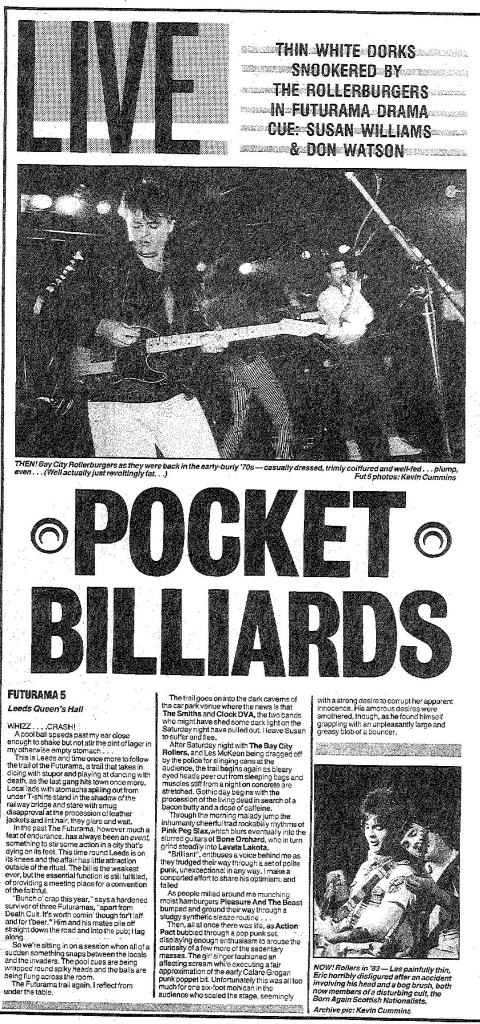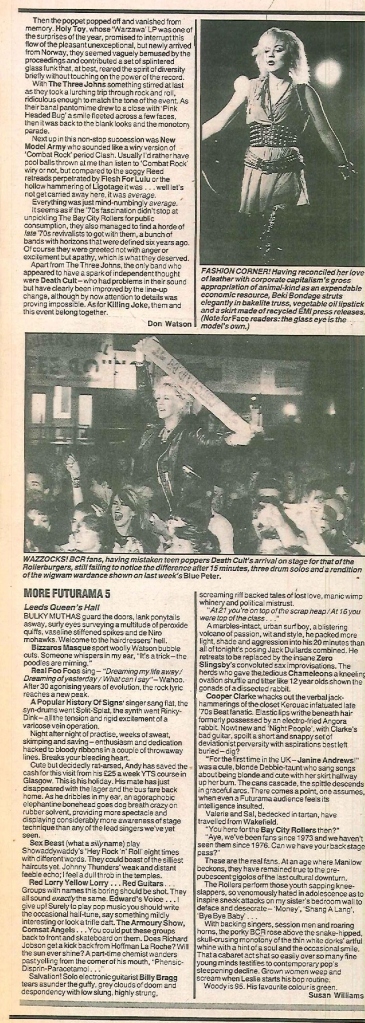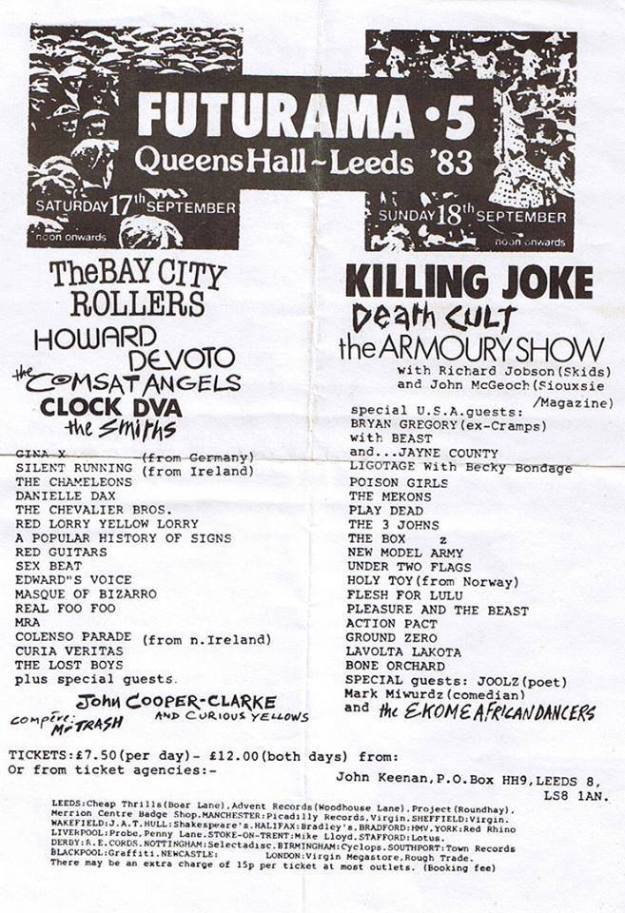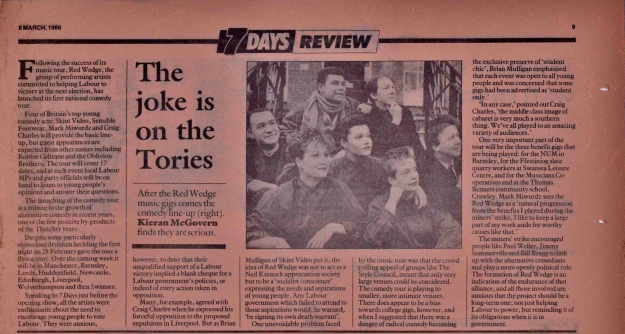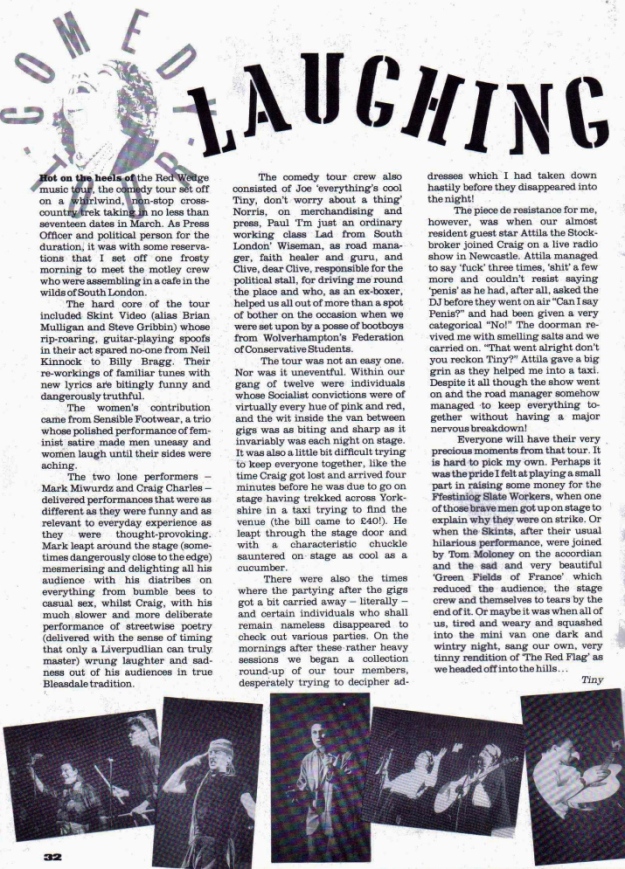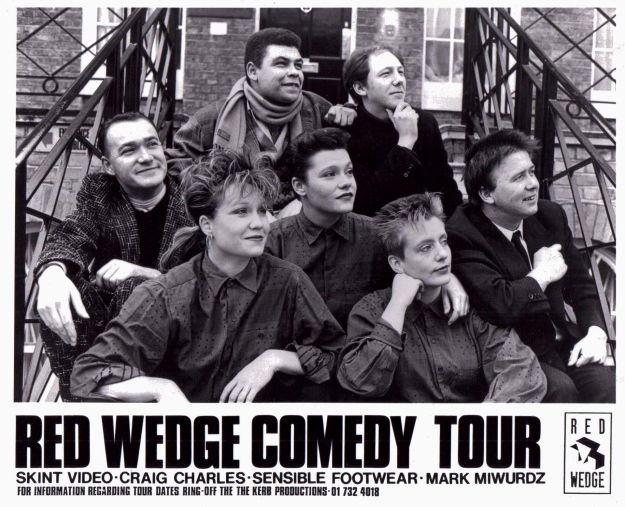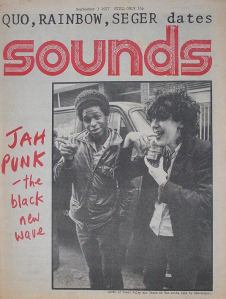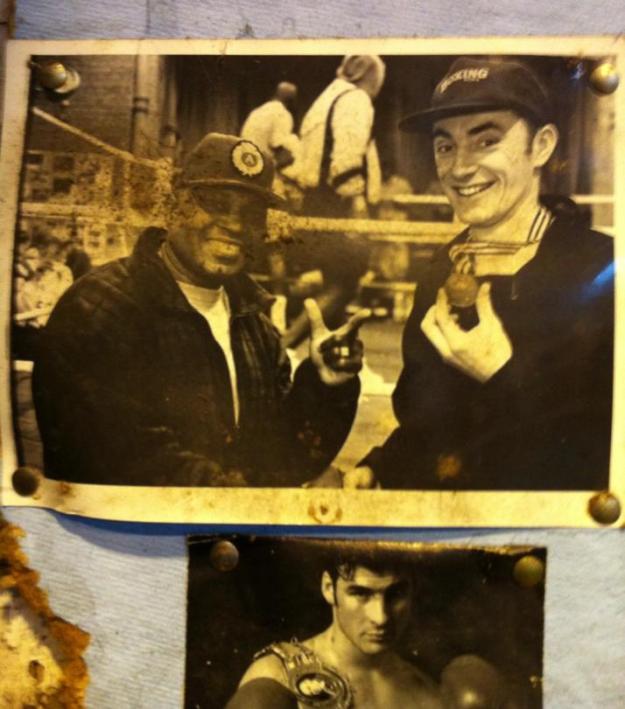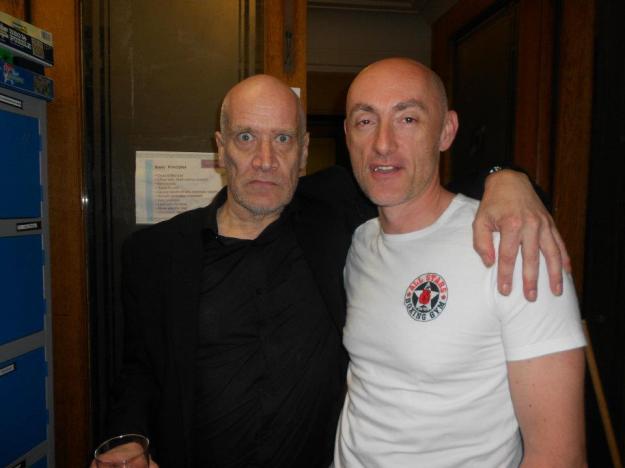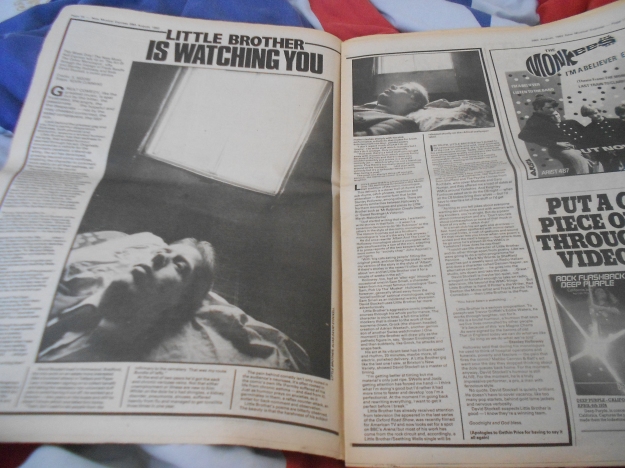From the NME, 24th September, 1983
Tag Archives: Mark Miwurdz
Red Wedge Comedy Tour, 1987
Mark Miwurdz And Punk On The Tube
Mark Miwurdz and Sunderland band, the Toy Dolls on Channel 4’s music show The Tube.
Mark worked on a fair few of the early shows. There’s also a bit of post punk Muriel Gray.
This is probably from 1982.
Bradford Gigs
Bradford in the 80s was a hotspot for ranting and punk gigs. Nick Toczek did sterling work putting on some great shows.
These flyers, from around 1987, are for some of the gigs he promoted.
Nick did the bookings, and ran the whole thing jointly with the late legend, Willi Beckett, who – amongst other things, was a fine poet and lyricist, fronted The Psycho Surgeons and was shadow Minister of Mental Health in the Monster Raving Loony Party.
Of particular interest is the one that lists info about the acts billed.
There’s an early Julian Clary cabaret gig here, he then gigged as the Joan Collins fan Club. Bloody good he was too.
Also worthy of note are a Seething Wells musical project Hobnailed Terrier Frenzy, I think that was with the Redskins’ bassists’ brother Mike.
Big thanks to Ginger John for these.
The Voices Of Britain – Seething Wells
Garry Bushell demands poetic justice for S.Wells, Little Brother and Garry Johnson
First part of a Sounds 2 page feature.
Sounds, Jan 29th, 1983
If the sadly stagnating music scene is threatening to get duller than a loop-tape of David Hepworth’s TV highlights, then one totally unexpected area of culture is getting the proverbial DM up the jacksie – poetry.
You don’t need a crystal gonad or Signor Spencer’s second-hand seer to know that you won’t be able to move this year without getting yer bent by poets. TV, radio, magazines and live gigs will be ringing in the reign of the new radical rhymsters – not yer usual privileged prima donnas poncing through the posies to cosy pensions and establishment praises, but passionate pogrom-packing word warriors penning mocking prole rock’n’roll polemics.
It’s the punk ethic taken to it’s logical conclusion – total d-I-y, the ultimate easy access protest. And so the year of the street-credible sonneteer is here. After months of percolating in the pop pages the ranting ranks of witty word-wrigglers like the perpetually pissed Attila are being swelled (poetry pun) by an inveighing invasion of pen-handed upstarts.
Verily, even the trio of vivid versificators showcased herein – socialist skinhead Seething Wells, voice of Oi Garry Johnson, and the consummate clown prince of carnal comedy Little Brother – are just the titillating tip of an invigorating iceberg of ingenuity and invective.
There’s radical rasta Ben Zephaniah, Scouse skin Alan Turner, The Tube’s only real find Mark My Words, Harlow’s Little Dave, Ginger John (The Doomsday Commando), London’s Belinda Blanchard, Bradford’s Joolz Denby, Lewisham’s black Beverley, guaranteed non-SDP fan, The Comrade, Jamaica’s Michael Smith and hosts more.
All these fire-breathing fun-slingers stand accused of conspiring to take a mainly middle class medium and haul it down to the streets. . .and real people.
You and I know it’s sonnet rock’n’roll but I like it, like it, yes I do…
Steven Wells, aka Seething, prime exponent of prole poetry as punk’s upstart off-shoot, believes firmly in giving the Betjemins and Horrorwitzs of this world the old roll over Beethoven treatment and bringing poetry down not merely to earth but into bed with the movement for real social change. In a (hard)-nut shell he’s in the business of rabbiting for socialism.
But although I’m not averse to the odd Joe Ashton column myself, I’ve always found myself disagreeing violently with the Swells vision in the past. Which in itself, is no bad thing, though I’d wager our previous political flare-ups had blinded me to the man behind the image.
After a few hours tear-arsing with him round the pubs, curry houses and dole offices of Bradford I came to see the cropped commando less as a hardline SWP hack rhetoric-robot, less as a cliché, and more as an intelligent, articulate, penetrating and personable chap.
As his best poems suggest Swells can be scathingly relevant, combining cynical insight with ruthless bite and a strong line in rib-tickling. Well would you settle for a ready way with groans…
“Why don’t they give Sounds journalists tea-breaks?” the scruffy urchin enquires when I meet him quite by chance on the Bradford train at Leeds station.
“Because it takes too long to retrain ’em! Hear about the bloke who got a job circumcising elephants? Not much pay but the tips are enormous…”
AAARGHHHHH!!! What did I ever do to deserve this? If I were you, blue, I’d stick to the records of which there are two, both on Radical Wallpaper, the first with Attila ‘Rough Raw And Ranting’, the more recent one with Little Brother called ‘The Rising Son Of Ranting Verse’. I prefer the former which features three of Swells finest: ‘Aggro Britain’, ‘Cadillacs in Bradford’ and ‘Godzilla Vs The Tetley Bittermen’.
But before we get to them let’s dilly-dally in the bald Bolshevik’s history book. Now 22, Swells hails from Leeds, via Bradford, and a solid Labour background, joining the Party at 15 and leaving school soon after to get a job cleaning toilets. After a few years alternatively frying Kentucky chicken in Bradford, working on the buses, and posing nude for Leeds art students (the mind boggles) he did his first gig as a poet at the fag-end of ’79.
Then flat-mate Little Brother was the inspiration. “I though to meself I’m more intelligent than him, I can do it better,” Swells quips. A series of guerrilla raids on New Order and Gang Of Four gigs followed. Like Little Brother, Swells started out just turning up at venues, and gigging for free with or without being asked; although his first national fame came via a string of caustic letters written to Sounds, one particularly vivid one coming out strongly in favour of the Nolan Sisters.
“Eventually I made contact with real poets,” he says, his voice heavy with sarcasm. “You can tell ’em – they’ve all got beards and glasses. They’re real middle class elitists. They made us realise we were more or less on our own.
“I’ve got very little time for the left over-sixties ‘radical’ poets. They still regard themselves as ‘underground’, to me the underground is the tube. You’ve got to be popular. You’ve got to make number one. That whole idea of alternative culture is out the window, communication is the key-word. That’s the difference between for example ‘YMCA’ and ‘Glad To Be Gay’. That’s why the Specials at number one with ‘Ghost Town’ during the riots, or the Jam at number one with ‘Town Called Malice’ was a million times more effective than Crass, there’s more ways of dealing with a situation than nutting it to death!”
By the age of 17 Swells had left the Labour Party and joined the Socialist Workers Party which to me at least contradicts the exemplary logic of that last statement, but we let that pass.
“I don’t support the SWP 100 0/0”, Swells explains, “but they’re the only party you’ll find on the picket line or getting involved in the Anti-Nazi League or the Right To Work Campaign. But when I’m up on stage I’m not trying to preach SWP politics, I’m trying to get ’em to THINK. I want to challenge people’s pre-conceptions, trendy leftie pre-conceptions as well.”
Hence the wet radical-ribbing ‘He/She’s Perfect’ on his current EP, and, deeper than that, the challenge to media prejudice of even being a socialist skinhead.
“The thing about all skinheads being Nazis is just crap.” Swells is adamant. “Look at all the skinheads on Right To Work Marches or at ANL Carnivals. You take ten skins from different parts of the country and you’d have ten different opinions and probably ten different tastes in music.”
Swells also points out, quite rightly, that skinhead culture originated in West Indian culture, not only just (just?) the music, but even the haircut! The standard media image of skins is pilloried in ‘Aggro Britain’ with The Sun in particular getting a good kicking. (‘The Sun’s so-called journalists, quack sociologists and fascist hacks’) although Swellsy admits he’s fascinated by it. “The poetry I write is more to do with tabloid journalism than standard poetry. The language is pretty similar. I like inventing mock Sun headlines like ‘Was The Ripper An Argy?’, or ‘Gland-Handed randy Andy Hankie Pankies In The sand Dune’ better known as ‘Koo – Wot A Stonker!'”
I pulled him over his Tetley Bittermen poems cos to me they seemed just to ne taking the piss out of working class people.
“It’s not an attack on the working class, it’s attacking the middle class stereotype idea that being working class means being thick! A lot of ’em can’t see past the next pint.
“That’s what I’ve got against Oi – it’s not enough just to be working class. Listen to Garry Johnson and all he’s saying is ‘Well, I’m working class’ and you say ‘And?’ And he says, ‘Well my dad was a miner’ And? ‘We used to live in a hole in the road. . .’ It’s not enough to be working class, it’s conceding politics to the middle class.
“I’d like Garry to do more. Attila’s a lot more show-biz than him, Garry was Oi – the poet. But he’s got a right to be paranoid about the Nazis.
“People say to me why are you anti-Nazi and I say why don’t you eat shit? I’ve never hid it, but I’ve been lucky in a sense. After the Leeds carnival this fucking massive skin in a union jack t-shirt came up to me and I thought ‘this is it’, but he gave me the thumbs up and said ‘You were great’.” (Personally I find the Left’s insistence on conceding the union jack to the right-wing worse than Gal’s thought crime but that’s another five page argument). “I’m very hard to beat up cos I smile a lot.” He smiles. “It’s called cowardice through friendliness. But it’s important always to challenge.”
Would you compromise your beliefs for a mass audience?
“You’ve got to compromise! But you’ve got to be honest about it. The Clash weren’t, the Jam were. . . Punk at the start was great, it was making really big political statements without preaching. Johnny Rotten should have done poems in between songs – he should have challenged pre-conceptions more. I hate the way punk is packaged now, which is why it’s great that Attila gets up with his mandolin. The Anti Nowhere League should bring in violins and finger cymbals!
“Punk just ended up in little factions. Some bands are class conscious and little else, Crass bands are anarchist in theory but little else, futurists dress up and little else . . . Why can’t there be an anarchist streetwise futurist band?”
As you can see Swells can be a compelling talker, and if you’re feeling compelled you can check out more of his ranting via Molotov Comics (30p plus large SAE from Flat 3, Belle Vue House, Belle Vue Rd, Leeds) his punkpoetry zine which he brings out whenever he can find £260 and which now sells over 2,000 per issue. Al Turner’s Another Day Another Word is it’s only rival.
‘A’ Bomb in Wardour Street
The Bro’s Grim, who saw the ranters gigging in the early 80s and is himself gigging today looks back and sees what the ranters brought to spoken word then and now.
As I recall it, 1977 pretty much blew the lid off. Before that everything felt under manners, squared away by our elders and betters. After punk, well, we just scattered and did our own thing. The ranting poets were very much a product of that process, just one of a number of different things that were going down. There was always someone on stage shouting into a microphone, even in the early days: that might be an SWP-type giving it large about RAR; or some old hippy bangin’ on about how we were all the same (we weren’t); or a drunk punk shouting lyrics. We were all writing lyrics at the time and some smart bastards worked out that you didn’t need to learn how to play or lug stacks of equipment around, just stand up and bang it out (being honest, that took me another twenty years, more fool me).
After Johnny Clarke broke, that was it. It was a legit way to get in on the act, blag into gigs, impress the girls. That was the ranters! Some of ‘em were good, stuck at it and got better. Others, not so much. But at least they had a bash at it. Memories are blurred (for a whole variety of reasons!) but I remember Seethin’, Mark Miwurdz, Attila, Big J. Clarkey, of course. Porky the Poet and Teething Wells are the two I remember most fondly, now both good mates. Many of the fanzine writers got in on it, Richard ‘Kool Knotes’ Edwards, for one.
There was other poetry bubbling under too, naturally, both before that and at the same time. The mod faces that I ran with, following the Jam, would be happy to chat on with Weller about ‘The Mersey Sound’ (Penguin Modern Poets 10). Paul checked Adrian Henri on the second album and championed Dave Waller’s work (I think some of his poems were published through the fan club mag which Paul’s sister, Nikki, produced). Waller’s ‘Notes From Hostile Street’ was published by Weller’s ‘Riot Stories’. Pat Fitzgerald supported on one of the early tours too. A few of us had poems published in ‘zines and the mod revival bands (the better ones) would check the poetry influence.
In terms of recordings, ‘Pop Art Poem’ (earlier on in this blog) was a product of that vibe. Meanwhile, Kevin Rowland was putting out some spoken word stuff with Dexy’s. Later, Billy Bragg recorded ‘Walk Away Renee’. That kind of poetry crossed over, whilst the ranters’ hard-gigging gave the old-school poets a much needed kick up the arse. It was a big mix and a good one.
Many of the ranters got into the alternative comedy scene and the variety of performers there, again, proved how blurred the boundaries were. Porky, obviously, Miwurdz too. Mark Lemarr started in through that route, I think. There were others! But I first saw Bob Boyton on that circuit and he’s doing some very good writing now. John Hegley came out of all that and he’s not done too bad with the poetry has he?
I’ve been gigging poems, fairly irregularly, on and off, for about a dozen years now. But it goes back way before that. As a kid I was particularly fascinated by Pete Townsend’s lyrics, and the poetry we did at school seemed to hit a chord. I did my fair share of teenage scribbling. Like I said earlier in this blog, once punk broke it open, then there was a proper way to get it out there. I was determined to be in a band, learned to play the bass, and wrote songs with a number of outfits over the years. None of ‘em got anywhere near ‘making it’ but we gave it a go.
Throughout that time I continued to write poetry, and never really stopped doing so. Some of it made it into ‘zines and I suppose I might have intoned over a mic at some point (I really didn’t have much of a singing voice), at some gig or other. I don’t recall. But I never was part of the ranting scene, though people I knew quite well were. One of the main reasons behind that was that it was pretty fierce. There was a good deal of physical threat in the air at the time and it could be a dangerous business, gigging.
That’s why it makes me laugh when, on the odd occasion, people ask me if I get nervous doing live work. What is there to get nervous about these days? Maybe you forget a line or two. Get embarrassed, stutter for a bit. You’re not going to get glassed are you? I find poetry beefs quite comical. To be honest my shtick is that the audience are more scared of me than I am of them! Wasn’t necessarily like that back in the ‘good old days’ of ranting poetry.
Which brings me to the point of this piece; Tim asked me to think about what I’d brought with me from those days. Well, three things I think. Firstly, content. Every single one of the ranters had something to say, something to get off their chest. It was heartfelt, it was real. So much of the poetry that I hear these days on the circuit is just an exercise in linguistic dexterity, or actors showing off. Nothing wrong with that, per se, but it can be a dull, that verbal wanking.
The second is the politics. I remember the ranters as being very political and very direct. There was absolutely no shame there, they went for it. These days, even now (when the political situation at home and abroad is quite dramatic), it is quite unusual to hear (or, even more so, read) an overtly political poem. I like to think I approach political subjects from some interesting angles, ambush the audience from time to time. Even so there aren’t that many that do even that, it’s strange. Of course, sometimes there’s a subject that just needs tackling head-on: I recently wrote a thing about Farage; ‘Shyster’; you can imagine!
Thirdly, and finally, back to where we came in, really: physical presence. The old ranters had to let the punters know they were there. So many poets I see doing live work are really diffident. Even if you’re reading off the page (and there’s nothing wrong with it, done well, though it’s not my thing), then out with it, don’t fuck about; own the stage. To finish on a down note, though, I think some of the best live poets don’t get the credit they deserve for the work itself. Sometimes (and, yes, for good reason, on occasion) those best known for their live work are looked down on by the more literary set. Which is how I remember it was in the old days. Maybe the ranters need to make a come-back!
Wilko Johnson and the Bro’s Grim
Little Brother Is Watching You
NME 28th August, 1982
This week only! The New Music Hall Express lets rip on ‘The Art Of The Comic Monologue’, sifts through the lineage of Frank Randle and Stanley Holloway and finds . . . David Stockell, a comic genius.
Great comedy, like the greatest music, is spat out by the bitter, the frustrated, the angry, the passionate…the hopeful and the desperate – not by the rosy cheeked contented, the idol rich.
Look behind the greatest gag and you find a painful desperation. Sickness, both physical and economic, spawns a wicked humour.
Little Brother has that sadness in his eyes, that wicked humour seamed through his act. Originally conceived as a vehicle for the terminally paranoid, a stand-up wimp, the act has developed, growing beyond comic confines, enabling the character to comment more easily on all that sadness, all the madness in the world.
The original device (the paranoid innocent) would have restricted Little Brother’s subject matter, imposed limitations on his humour and, in presenting a pathetic character, probably fed an audience’s fears and prejudices instead of exploding them. Now he comes at his audience from all sides.
Little Brother, like the sharpest comics, deals with truth – a fragile commodity. He writes about mums and dads and kids, the school and the factory, the people who run our lives and the people who live them. He is a poet in the great tradition of the Northern club comedian.
“Put your hands together for…”
Little Brother is David Stockell, all the way from Bradford. I don’t know how young he is (21? 45?) but it doesn’t matter. Given his talent, and the medium he has chosen to work in, there’s no time limit for success, no threat of early artistic redundancy – he has only to wait.
He started to write in the ’60s, “… when I was nine. I’d been writing poetry since I were a kid and I’d also been writing comedy sketches but I s’pose the first time I thought about performance was after ’76. Me and SWells wrote some lyrics together and started this band called The Luddites…”
Bradford’s cool entertainer on guitar and long-time friend and sex poet Seething Wells on wayward bass…
“Aye. Actually we never got off the ground. I started doing stuff on me own and got to support The Clash and The Gang Of Four and the SWells realised, Eh, it’s an easy way f getting famous is this, so we started working together separately like. And now he’s got famous.”
But you got to play with The Clash.
“Cos Kosmo Vinyl was doing ’em in them days and he recognised me as the little skinhead who’d been put through the window by a bouncer for being drunk ‘n’ disorderly and suchlike when the Stiff tour played Leeds University.”
A bouncer threw you through the window?
“Well, some big glass doors. It was bonfire night and he was dressed as a cowboy… anyway, Kosmo Vinyl came up to me at George’s Hall (Bradford) and asked what I was doing with meself now. I said I was reading poetry and he said to come along to the next Clash gig and do it there. So I did… and got cans thrown at me.”
What sort of poems were you writing then?
“Crap ones, basically.”
Showbizz might seem like a dangerous trade when your first taste of success is a Worthington E can between the teeth but it beats living in Leeds and working for the Royal Ordinance factory or living in York and working in Rowntrees.
David Stockell lived in Holmwood, Bradford, the only punk on an estate more interested (like a hundred others) in Tetleys and Paper Lace. In between signing on to collect benefit and taking the necessary non-unionised duff jobs to avoid having it cut off, he worked as a busman – two years on the buses and still he doesn’t know which one takes him home.
“Yeah, but I used to tek people from the infirmary to the cemetery. That was my route. Bundle of laffs.”
At the end of two years he’d got the sack and chronic varicose veins. Not that either unemployment or illness are new to him. Whilst on the dole he’d had shingles, a kidney disorder, pneumonia, sinuses, suffered heavily from flu and managed to get tonsillitis three times in one year.
The pain behind comedy isn’t only rooted in the audience’s neuroses, it’s often rooted in the comic’s own life (Formby suffered all his life from chronic asthma – and died from it). Just as humour preys on anxieties, so it germinates in them, a reflex counter-attack, an outlet for back-comment and observation.
Little Brother’s poems are bitterly observed. The beauty is that the harshness of his subject matter clashes sharply with his slick performance, a dialectic that makes for brash entertainment not dour, painful poetry.
“I don’t regard much of what I do as ‘poetry’. I do write write stuff which is poetry but I don’t do it onstage. Only occasionally.
“That said, there’s a lot of stuff you can get away with in poem form which sounds funny because it rhymes and there’s ideas you couldn’t possibly put across in a straight comedy act – which is why I’m not a stand-up comic. Plus there’s too many stand-up comics around at the moment… I did start with comedy but it’s a lot harder being a comic than being a poet.”
The poet can always skive off and get serious; the stand-up is a slave to laughter.
Little Brother is a hybrid but not a rare one. His technique is rooted in the Music Hall tradition of the comic monologue. This delivery is a clever trail of rhyme and sub-rhyme, catch phrases, repetition and alliteration – the comic form that broke Stanley Holloway, amongst others. There are certainly similarities between Holloway’s Northern monologues and pieces by Little Brother such as ‘Mr Robinson Cheats Death’ or ‘Sweet Revenge (A Victorian Marsh-Melodrama)’.
“I just started writing that way, I wanted to write stories in that form – it wasn’t a conscious decision to do ‘Mr Robinson’ or the others in the style of the comic monologue. The reason it comes out as a Northern monologue is ‘cos it’s the way I talk anyway.”
He did once rewrite ‘Albert And The Lion’ (a Holloway monologue about a youngster who gets swallowed by a lion at the zoo), adapting it to press reports of the two zoo keepers who were eaten by “society chap” John Aspinall’s pet tigers.
“With ‘big cats eating people’ fitting the original piece, and not liking the bloke, I wrote my version of the story in the style of ‘Albert’. If there’s stories in the news I’ll often do about ’em and let Little Brother use it for a couple of weeks in the act.”
Holloway, too, had an ‘alter-ego’ (though an occasional one) in Sam Small, a character taken from his most famous monologue ‘Sam Sam, Pick Up Tha’ Musket’. Holloway, however, generally shied away from the ‘social/political’ satirical monologues, using Sam Small as an incidental wacky diversion. David Stockell uses Little Brother far more adventurously.
Little Brother’s aggressive comic intellect courses through his whole performance. The character is more total, a full-time bitter mockery that is closer to the work of that supreme clown, Grock (the shaven-headed creation of Adrien Weetach, another genius son of another Swiss watchmaker.) One moment Little Brother will draw pity as the pathetic figure in, say, ‘Brown Envelopes’… and then suddenly, like Grock, he attacks and snaps back.
His act at its vibrant best has brilliant speed and rhythm, 20 minutes, maybe more, of electric, polished delivery. A Little Brother gig like the last one I saw, at Brixton’s New Variety, showed David Stockell as a master of timing.
“I’m getting better at timing but me material’s only just ripe. SWells and Joolz getting attention has forced me hand – I think what I’m doing’s good but I’d rather it had more time to fester and develop ‘cos I’m a perfectionist. At the moment I’m going back and rewriting everything: I want to get it perfect before I break.”
Little Brother has already received attention from television (he appeared in the last series of the Oxford Road Show, was recently filmed for American TV and now looks set for a spot on BBC’s Arena) bu most of his work has come from the rock circuit and, accordingly, a Little Brother/Seething Wells single will be released shortly on the rADical wallpaper label.
In truth, Little Brother isn’t suited to the cavernous halls and cold, vinyl portraits of the rock ‘n’ roll arena. It’s in the clubs that his performance shines. Sadly, the clubs that once showcased quality comedians like Sandy Powell no longer exist but there is a comparable circuit, now stale and crassly conservative, waiting to be shaken up and sparked once more.
“The thing is, I am a product of the rock circuit so I’d like to carry on working there as well as clubs and the problem is, you can’t just turn up at clubs like you can at rock gigs – you’ve got to have an agent. It’s a real cut-throat business.
“I’ve done quite a few clubs. I got in touch with a couple of showbands, like Radiation from Sheffield and the Psyche Clones from Rochdale, who cover Madness and Gary Numan, and they offered me a load of dates at WMCs arounf Yorkshire. And Keighley Funhouse asked us to do the CB night – when all the CB blokes bring their wives – but I’d have to rewrite a lot of stuff or I’d get floored.
“As long as you tell jokes about everyone wanting sex all the time and with women with big knockers, you’re alright. But do a poem about contraception and it’s: ‘Don’t you talk about contraception or none of that muck in front of my wife – stitch that!'”
In a small club his act gels and drrrives – fast, hard patter splattered with mimic detail and vocal tricks, a rush of gestures and sound FX that never lets you know when one poem’s ended and the next’s begun – but where does he go once he’s played all the WMCs in Yorkshire? How does he cap that?
“I could use the character of Little Brother and do other things apart from poetry. Like we were going to do a radio programme for Pennine. . . Mark My Words (a Sheffield poet) has got a weekly spot on Radio Hallam and does a character called Damien Napier, an alternative comedian – he goes into the studio, sits down and takes the piss. . . Great.”
David Stockell is maybe too quiet, not arrogant or forceful enough to take on radio, television, life beyond the WMC fringe. . . But Little Brother is hard. If Pinter’s the Writer, Red Skelton the Mime-artist and Frank Randle The Comedian – then Little Brother is the Poet.
“You have been watching. . .”
Little Brother is a serious proposition. To paraphrase Trevor Griffith’s Eddie Waters, he works through laughter, not for it.
He is a brutal humour, a humour that says we live lives controlled by other people.
“It’s because of this ‘ere Magna Charta
As were signed by the barons of old
That in England today we can do what we like
. . .So long as we do what we’re told”.
– Stanley Holloway
Holloway said that during his monologues he used to think of hospital operations and funerals, poverty and fascism – the pain that fires the comic?
Mebbe Cannon & Ball’s act went sour the day they stopped thinking about the dole queues back home. For the moment, anyway, David Stockell’s humour is still ALIVE. For the moment, he is a truly impressive, a pro, a man with ferocious style.
No quote, David Stockell is quietly brilliant. He doesn’t have to cover vacancy, like too many pop starlets, behind gold lame jackets and nervous verbosity.
David Stockell suspects Little Brother is good – I know they’re a winning team.
Goodnight and God bless.
(Apologies to Gethin Price for having to say it all again)
X. Moore
Mark Miwurdz – Part 3
The decline in ranting poetry
I eventually started to move more into straight stand up, as my poetry intros got longer and the poetry less. For a brief period, I had about three or four poems left in my set and would simply segue into them whilst in the middle of a stand up routine, without any introduction. It was quite an original style, I haven’t seen anyone else doing that. Swells went off to write for the NME, Attila was always in his own bubble, off supporting the Newtown Neurotics in Albania or wherever, Joolz was off with New Model Army, and Little Brother seemed to be performing less.
During the miner’s strike, me and Little Bro did a lot of benefit gigs around Yorkshire and there was one miner, called Bill, from Maltby colliery, who became taken with the cabaret going on and got a set together, of anecdotes, a couple of miner’s songs and some poetry he’d written. I got him on at a Cast weekend. The audience loved it, a real life striking miner, regaling them with poetry. Right on!
Even when stand up began to colonise the cabaret circuit, you’d still see quite a few comics doing a bit of poetry. People like Owen O’Neil, and Felix I believe, and quite a few others who I can’t think of atm. I think the poetry was used as a, first base, vehicle for comedy, for quite a few fledgling comics, who hadn’t the confidence of doing a whole set of straight stand up yet or were still trying to find their own comedy voice. But there was also an attitude emerging that poetry was a bit like stand up’s wimpy younger brother, and there were a few people doing poetry as a characters, like Andy Greenhalgh, who did a rock n roll poet, I think. Sort of poetry sending up poetry if you like.
I think there was a growing feeling then, amongst comedy audiences that poetry was a bit naff I remember hearing a few groans when a stand ups said, ‘ok, I’m going to do a poem now’. John Hegley seemed to be the only person still doing pure poetry on the circuit, he could even win over the notoriously tough Tunnel Club crowd, with poems. The only actual poetry gig aligned with the London comedy circuit I think, was Apples and Snakes. They knew there was a crossover and were never snotty in those days about booking people like me who were combining stand up and poetry.
Once I’d gotten over the self-consciousness of being constantly compared to JCC, I was able to acknowledge his influence more, and I wrote a homage to him, in his style, called ‘He’s not John Cooper Clarke, I am!’ claiming that he was an imposter and that I was in fact, the real JCC, which I used to do in this longer one man shows at Edinburgh. It was important to me to acknowledge the poetry roots. It was originally written years before, for a gig at the Limit Club in Sheffield when I supported JCC. The local papers had made a War of the Roses, Lancs Vs Yorks thing of it so it was sending that up. He was happy for me to go on during his set and perform it. “Aye, come on after Salome, keep it snappy.”
Interesting that you can see the performance poetry family tree going from Music Hall monologists, through to a few TV monologists (Cyril Fletcher/Pam Ayres), the folk circuit, Billy Connolly/ Mike Harding etc always used to do a few poems, the punk/new wave and pub rock scene had JCC, and us lot, and then the alternative cabaret/variety circuit. The two exceptions were the 70s Working Men’s Club circuit, and again in the post-cabaret Comedy circuit, Jongleurs era. In both those arenas you saw virtually no poetry. I see there are more poetry nights/clubs going now, so it will be interesting to see where it goes next.
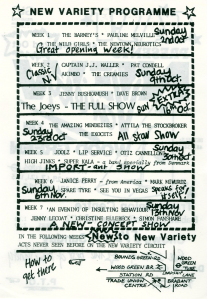
Highs and Lows of poetry
Apart from the actual stupendous fact that performing poetry took me out of a factory job and into full time employ on stage, there were many highlights, inc some of the things I’ve already mentioned. But one stand out gig was Sheffield Top Rank, early 80s, (where I used to go, dancing to Prince Buster’s Al Capone, at the under 18s discos, in the early 70s). I was on with The Redskins and Gil Scott-Heron, at the height of his powers. It doesn’t get much better than that. I’d seen the gig advertised already and went to the promoters and said I HAVE to be put on the bill. I already had a good relationship with them anyway, but I think they saw the blazing intent in my eyes and just said, no problem. And I was even paid for the privilege.
My biggest regret of the poetry days was one midweek afternoon, I got a call from the then social secretary at Leeds Uni, Andy Kershaw. He needed a last minute support for a band that night. The fee was £30. But I was recovering from a really bad throat infection and was still ill. I said I’d try and organize a lift, because I wasn’t up to sitting on a train and hanging around. Anyway, I couldn’t get a lift and called back to say I’d have to pass. The band was The Clash. And I never did them live. I may even have the notes of the call on an old phone pad that had sat by the phone in the hall at my mum’s.
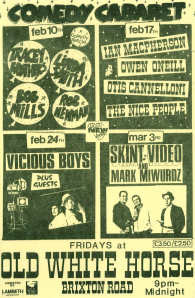
When I think back to those early days, where you would wander on to a load of people standing up, in a refectory, or a dank dark club who didn’t know who you were and could have just walked off to the bar, or shouted you down, and how we quite fearlessly stood there and won them over most times, with a lone voice, when they had come to see a band, it felt like we were doing something new, it did definitely take guts or just naivety and bravado. Heady times…
And there was this one guy who used to turn up regularly at Cast New Variety gigs, sometimes with fresh bruises from his latest Red Action exploits. I remember having the ‘shouldn’t use the word cunt’ debate with him. The same one that I had had a couple of years before, when I first started doing Cast gigs. I heard later he had started doing poetry under the name Teething Wells, though I never saw him live. Often wonder what happened to that boy…
Mark Miwurdz – Part 2
Mark talks more about his days as poet and the start of his comedy career
Alternative Cabaret Crossover
Around the same time as the new performance poetry was spreading, the alternative cabaret scene was growing and the two easily gelled. Joolz was in the Cabaret Futura show at Edinburgh, founded by Richard Strange, along with singer/pianist Sharon Landau and Richard himself. And Swells was doing the Alternative Cabaret Tour with Tony Allen, Tymon Dogg, who was a maverick folk singer and mate of Joe Strummer’s, and Akimbo, a mixed race musical duo. He couldn’t do a few of the gigs and suggested I replace him, which I did, and fitted in immediately. I then went down to London to do a gig with them, with Swells too, and after, Tony Allen was compering the old Comedy Store, so he took us along to do open spots. This was now early 82, during The Falklands war. Swells would read in full skinhead gear with a Popeye style sailor’s cap on. Very surreal. On the bill was Jim Barclay, John Hegley, and Nick Revell. There were people like Rik Mayall and Pete Richardson in the audience. I went on and after a short while, got the traditional gonging off. But when Swells went on , in full skinhead gear, ranting about the Falklands, it really threw the audience. There was no gonging or booing or applause. They just listened and there was an uncomfortable silence. It was very surreal. You know what Swells was like, a total wind up, and he never let it drop that I got gonged off and he didn’t. I countered that, I did get one laugh at least, he got none!
There’s a book about the history of cabaret, called Cabaret, written by Lisa Appignanesi. She wanted to revise the book with a new chapter on alternative cabaret, so she came to a few of those gigs and did a piece on Swells, recognizing the link between cabaret and poetry. I have the book.
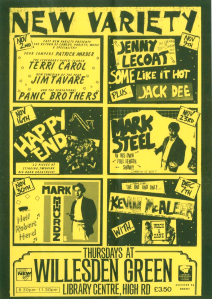
Life on the road
So we were all travelling around the country doing, poetry and cabaret gigs, and it was a very wandering minstrel lifestyle type of thing. We never stayed in B&Bs, always got put up by someone. A random Swells memory: We had been performing at a uni in West London and were being put up by some students on the rough South Acton Estate. About midnight, me, Swells and some students all got in the lift on the ground floor. The doors shut and the lift didn’t budge. We’d overloaded it, about 9 of us in a 6 capacity lift, and it was stuck, and very crowded. There was a lot of joshing, but it was quite worrying, the air was already getting stuffy and it was midweek, after midnight and quiet. People started shouting to try and get someone to hear us, then people were telling other people to stop shouting all at once and let once person shout. Someone lit a fag, unbelievably. I was getting a bit panicky and knelt down to get some less breathy air. Eventually we did attract someone’s attention, and after kidding us on that they were leaving us there, they called the fire brigade. Swells then revealed that he’d nicked a load of stationary from the uni and was worried that the police might also attend, and was getting ready to scarper when they let us out. Anyway, no police came, but it was 45 minutes we were stuck in there with not much air. Scary. We went into one of the student’s flats for a smoke and drink and Swells was taking the piss as usual about how he hadn’t been worried but I’d been bricking it. So after a couple of hours, it turns out that the student we were staying with lived a few floors down, so we went back into the stairwell and all looked at each other, stoned. Swells was like the goader, saying he wasn’t scared. So stupidly, we got back in the lift again! But it didn’t stick again, thank God.
Another time, me and Swells were at Birmingham New St and saw Tony Benn. We went over and Swells told him we were political poets playing in town, and invited to the gig then gave him an Attack on Bzag fanzine, which he accepted graciously.
There was one gig I remember, at The Brixton Ritzy, me, Swells and Little Brother, all supporting GBH and another band called The English Dogs. When the gig started, it wasn’t that full, just a smattering of mean looking skins all hugging the back wall and the sides of the venue, peering at us, out of the shadows, but it filled up gradually. I think I was on early and went down ok, not a great reaction, but no trouble. By the time Little Brother got on, he had a parka on, with the hood up, because of the spitting and during one poem he had a kid who’d jumped on stage, in a headlock under one arm, and the mic in the other hand. Little Brother used to carry a few props, one of which was a little medieval spikey mace, which he brandished during a poem called ‘Don’t call me possum in front of my mates’ supposedly aimed at his girlfriend. I think he had his bag checked on a flight, probably to Edinburgh, and had to explain the presence of this ‘weapon’ to the officials.
Porky I met a little later when we were both booked the same Cast gigs, and he turned up with Joe Norris, who went on stage with him during ‘Nobby’ to hold the cassette player. Porky was quite shy back then as I recall, and got to know better over time and during the Red Wedge days.
I started doing The Tube, on C4 and did several of my favourite poems from my old set, even though live, I had ceased to perform them. It felt like I was putting them to rest, marking a line in the sand and performing them for the last time.
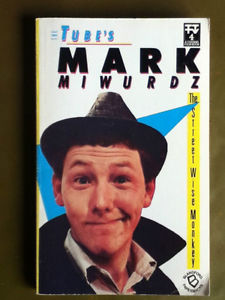
(Part 3 follows)
Mark Miwurdz – part 1
Poet and comedian Mark has been good enough to share some memories…
Mark Miwurdz origins
I began performing poetry around Sheffield in 78/79 as Mark Miwurdz. There was a thriving local band scene, a lot of post punk electronic stuff and I supported bands like Cabaret Voltaire, and The Comsat Angels. I was working in a factory at the time and going to see local bands. I had never been that interested in poetry at school, but I did love comic lyricists, like Jake Thackray and Tom Lehrer, so I’d make up songs rather than poetry. I also liked the lyrics in musicals, even though I was straight! The only poets I liked were Cyril Fletcher doing his odd odes on That’s Life and Pam Ayres. Also, any stand ups that used inventive language, particularly Les Dawson and Billy Connolly.
Then I heard John Cooper Clarke around the time that I was socializing on the band scene and it all sort of clicked. The inspiration for doing live poetry at music gigs came from JCC, but the influences were more diverse. He was the only person most people had heard doing poetry in that setting so the comparisons were inevitable. The only other gigging poets I was aware of then were Linton Kwesi Johnson, and I’d heard of Patrick Fitzgerald, who was being labelled as a poet with music. I was also vaguely aware of John Dowie who was doing acerbic songs and poetry on the band scene in Manchester.
I was very popular around Sheffield, and because there were so many gigs, I did a lot of them. I was usually referred to as a punk poet, or Sheffield’s JCC and have several old music fanzines with reviews and interviews from that time. I had never heard of ranting at that point.
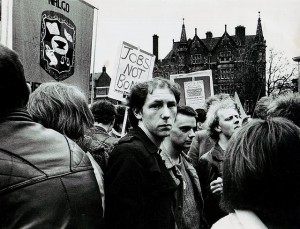
Ranting Poetry
Then an issue of the NME came out and had a full page article by X Moore about a skinhead poet called Seething Wells. It told of how he and another poet called Attila The Stockbroker, had invaded the Poetry Olympics in London, and performed a ranting style type of poetry, taking the piss out of the event, calling it The Poetry Ol-limp pricks. It made it sound like they had literally ran on stage and took over, though I’m not sure exactly how accurate that was. The organizer Micheal Horovitz, may or may not have agreed to them performing, I don’t know. But that is where the whole popularising of ranting poetry started as far as I recall. The article went on to say how Swells was receiving correspondence from someone in jail who he’d influenced, who wanted to do the same as him. (This later turned out to be Ginger John, I believe) and mentioned that there was a poetry scene in Bradford with other like minded poets, and named some of them. Joolz, Little Bro and Wild Willi Beckett I think. I was at once elated that there were more poets around, but deflated not to be mentioned.
This was a revelation to me. There were a bunch of other performing poets only 40 miles away and I never knew! So not long after that, I was contacted by Little Brother and invited to appear at one of their Bradford poetry nights. It was in a pub called The Vaults and was advertised as The Rhyme Bandits. I don’t think Swells was on that night, but there was Little Brother, Joolz and Wild Willi Becket who did mad poetry in a character type performance, with a backing band who were Justin and another guy who were starting out in New Model Army. (There’s a short docco on him on YouTube, he died in 2007 and was deffo in that early wave of poetry) I wouldn’t say that any of them had a ranting style. Joolz was like a dramatic, spoken word performer, Little Brother was quite political in content but owed more to the monologue style of music hall than any angry ranting. Eventually I came across Swells at a uni gig and he wasn’t like any of the others I’d seen, much more aggressive, obviously because of the skinhead gear, and his style, tough nut ranting, really was the epitome of ranting.
Swells and Little Brother then became mates and would stay over in Sheffield, where I was still working in the tuning fork factory and living at my mums. I organised a few gigs with them, the three of us performing as The Street Wise Monkeys. I recall after a gig, back at my mums, we played Poetic Consequences. Write a line, fold the paper over and swap, then write your next line, etc. We ended up with three, 4 line poems, interwoven. I was influenced to write a bit more politically because of hanging around with them, but the accent was always on laughs with most of us. At gigs we’d usually be billed as Ranting or Punk Poets, but weren’t too fussed about the labels, we’d discuss it I think we were all a bit fed up with constant JCC comparisons, but were just happy to be gigging. Little Brother eventually got his full page X Moore article in the NME, and I got mine in The Melody Maker, written by a northern journo called Frank Worrall. Poetry gigs were often reviewed in the music press and I remember one review in the NME when I supported Nick Cave’s The Birthday Party, saying ‘Mark Miwurdz mixes a frothing cocktail of poetry and comedy, leaving the audience shaken and stirred’
I still hadn’t encountered Attila, who was becoming a bit of a character in my mind, not least because of a review of a gig he’d done in a North London pub, which was a right wing skins hangout. It was called The Blue Coat Boy, and I think he was supporting the Business. Anyway, apparently he didn’t get through much before they clocked that he was a ‘commie’ and it all kicked off. The big thing in the review was that he had ‘had his mandolin smashed by thugs’. He was based down south, but when I eventually gigged with him, like Swells, his image belied a more mild mannered regular bloke. I remember him staying over at my mum’s after we arrived late pissed after a gig. The next morning I got up to find him playing mandolin in the living room, for my mum, who was sat there with a cup of tea and a fag on!
New Variety
I went up to the Edinburgh Festival early 80s as a punter and met Roland Muldoon who ran the Cast gigs, where Attila, Swells and Little Bro were already regular performers. He had taken up the show, A New Variety of Poets, to the Assembly Rooms. I think it was Little Brother, Swells and Benjamin Zephaniah. Anyway, LB introduced me to Roland and I got onto the Cast circuit. I remember Swells and LB telling me that I’d love the gigs and would go down a storm, but not to say the word ‘cunt’ because the feminists didn’t like it. The Cast gigs were fertile ground for poets and it was there I saw more styles, carribbean poets like John Agard. Quite a few other poets, Lemn Sissay, and female poets, Liz Lochead, Claire Dowie etc. The only female ranting poet I remember is Big J, (Janine Booth) and of course Joolz, though she was not a ranter as such.
The Ranting Poetry label stuck around for a bit. There were some young poets like Little Dave, and a now released from jail, Ginger John, who were into the ranting style but then others, like Dino The Frog were just doing their own thing. Every town seemed to have it’s own poets, a guy called Nod in Newcastle, Swift Nick in Hull, there was a poetry ensemble in Sheffield called The Circus of Poets, though not all were that keen to align with what was going on nationwide. I worked with Ian McMillan from Barnsley back in the day, early 80s but he seemed to steer clear of the emerging cabaret/poetry scene and keep himself to himself. Maybe he thought of himself as a more ‘serious’ poet, I don’t know. It would be interesting to find out what someone like him, who could have done the cabaret circuit and supported bands, but stayed close to home and ploughed a different furrow, as far as I know, thought of what was going on.
So pure Ranting Poetry was, I think, a brief splash, but it’s ripples were felt far and wide for some time after. I see it a bit like how The Sex Pistols were the defining nucleus of punk, but then loads of pub rock bands who had been performing for a while, got labelled under the new wave/punk banner, it was the same with ranting. That Swells NME article, about crashing the Poetry Olympics, to me, signalled the birth of ranting, but lots of poets of different styles were spurred on and swept up in it. I think there were also quiet a few older, 35-50s age poets who came out of the woodwork too. A few of these older poets started to put gigs on around the country, putting on the younger radicals, whilst compering themselves. I would put Nick Toczek in that bracket. A fully formed, social commentary poet who wasn’t part of any scene, and worked in schools and stuff, but was able to slot into part of the new radical poetry scene. He didn’t look or sound like Swells or Attila, (neither did I for that matter) so not sure he would have been as at home in the Brixton Ace supporting GBH but It was an all encompassing period and poetry in all forms was being performed all over. There was a guy who was a lecturer at a college near Manchester, he’d done poetry over the years. He started a poetry gig in the 6th form college. In the student’s lunch break, they would all file in, in the assembly hall and watch a political, often foulmouthed poet. That would probably not happen now… (part 2 follows)

